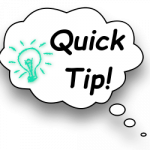Your brief dictionary… Listed A to Z
Here you will find a brief definition of terms used on this site as they pertain to the online and business world.
 Quick Tip!
Quick Tip!
If you’re in a hurry, rather than scroll through to find what you’re looking for you can bring up the find tool which is different to the search box on this website.
Using your keyboard… (press the keys simultaneously)
For PCs: Ctrl + F
For Macs: Command + F
You’ll have a box pop up on top right hand corner of this webpage, looking similar to the picture below …
In the blank box type in the word or phrase you want to find and it will be highlighted throughout this webpage.
Use the up & down arrows next to the word input box to jump to the different location(s) that word appears.
By the way you can use this tip on any webpage!
Biz Glossary…
Accounting:
Accounting can be described as a way of assessing the assets, liabilities and cash flow from the day to day bookkeeping records, to communicate the financial health & determine the success of a business to all interested parties.
Business:
A business basically trades goods or services or a combination of the two
to a customer for goods or services or a combination of the two.
With the aim of covering their costs at the very least but ultimately make a profit.
Businesses are also known as an enterprise, corporation, company, firm, to name a few.
Business Model:
A business model is the template for a business to compete in the market place. It describes the core strategy, means or methods, by which the business will operate to generate economic value.
Such as selling through auctions, selling directly to customers, selling through distributors, selling online, licensing products to other businesses, and so on … Most businesses use a combination of these models thus creating their unique model.
Business Owner:
A person or a group of people or an organisation who own a business entity.
A small business owner will generally own the whole business, make all the decisions, operate and manage it.
Business Plan:
A written document describing in detail what a business aims to achieve and how it is going to achieve it – from a marketing, financial and operational viewpoint.
Business Type (also known as Business Structure):
Business type is the legal structure of the business. Such as sole trader, partnership, limited company, and so on … These business type names will differ from country to country.
Chargeback:
Occurs after a sale has been settled.
A chargeback is when a cardholder disputes a transaction and requests that the card issuer refunds them. At which point the Seller is charged the amount of the transaction.
Commercial:
In business it pertains to the activities of the business, including the exchange of goods or services for financial profit.
Consumer:
A person who uses goods and services.
A customer and a consumer are not necessarily the same. For example: The customer purchases a gift. The receiver of the gift who uses the gift is the consumer.
Customer (also known as a Buyer, Purchaser):
A person or business who buys or trades for goods or services from a business.
Customer Service:
Customer Service is about giving customers a good experience; by meeting customer expectations in a helpful manner, before, during and after they have purchased and used the goods and services.
Dropship / Drop ship:
To ship the physical products in the Dropshipping Business Model.
Dropshipper / Drop shipper:
The product supplier that sends the physical product directly to the retailers’ customer at the retailers’ request.
Dropshipping / Drop shipping:
An order fulfilling business model whereby the retailer never physically sees, handles or stocks the product(s) it promotes & sells. The product supplier sends the product directly to the retailers’ customer at the retailers’ request.
Employee:
A person hired by a business under a contract of employment with recognised rights and duties, part-time or full-time, for a wage or salary.
Goods:
In business goods are material/ tangible items.
Industry:
Industry is the classification of a group of businesses with related primary activities; such as agriculture, travel, health, manufacturing, affiliate marketing, and so on …
In-house:
In business, in-house is a term used for conducting any business process or job function within the business rather than outsourcing it.
IT (information technology):
A single term used to include all computer & telephony technology available today and those not yet conceived.
Including all forms of this technology used to create, store, exchange and manipulate information in various ways and formats; such as videos/movies, graphics/images/photos, voice/music, multimedia presentations, business data, …
Manufacturer:
A business that makes goods for sale.
Marketing:
It’s about meeting the needs and wants of customers.
Marketing incorporates everything in the process of placing the product or service in the hands of the customer; such as packaging, distribution, pricing, advertising, public relations and sales.
Minimum Order:
A business requiring their customers to purchase a minimum amount in value or unit count.
Net Profit:
Income less all costs/expenses = Net Profit
Net Terms:
A credit term used determining when an invoice/bill is to be paid. Net terms are often described as ‘net 10’, ‘net 30’ or similar, where the ‘30’ means the number of days the invoice/bill is to be paid. It could be from date of invoice, or date order was shipped. The terms are normally agreed upon when the supplier extends credit facilities to the customer.
Niche:
A distinct market segment identified and wanted by a business as customers for their products/services.
Niche Marketing (also known as Micromarketing):
- Identifies the customer base for the business by finding the needs, wants and requirements of a specific well defined small demographic of the population.
- Develops and delivers products/services that satisfy those needs, wants and requirements.
- Concentrates all promotional efforts targeting this group of people to convert them into buying customers.
Offline:
Not being connected to the internet via a device.
This term is also used to refer to traditional day to day life as we know it, such as a ‘bricks and mortar business’.
Online:
Being connected to the internet via a device.
This term is also used to refer to non-traditional day to day life, such as ‘Laptop Lifestyle’.
Outsourced:
In business, outsourced is the contracting out to another business or individual a business process or job function rather than doing it in-house.
Overhead:
The ongoing expenses associated with operating a business.
Profit Margin:
The difference between the cost of a product and what it is sold for. Margin calculations may consider only the cost of the product sold or may also include overhead and other variable costs.
Purchases:
A customer makes a purchase when buying from a business goods or services predominantly with money, but could be money or goods or services or a combination of the three.
Research & Development:
Research & Development (also known as R&D) is mainly associated with technical or scientific research. However in running a business it is also the developing of new and improved products and services to fit customer needs discovered from market research.
Reseller:
A business that purchases goods or services in order to sell it on to their customer base.
Retail:
The sale of physical goods or services to a buyer (customer / purchaser).
Retailer:
A business that sells directly to a buyer (customer / purchaser).
Salary /Wage:
Salary & Wage are at times used interchangeably, however most businesses make the following distinction:
Salary – A fixed amount, normally paid on a monthly basis
Wage – An hourly rate paid for the amount of hours worked, normally paid on a weekly basis
Sales:
A business makes a sale by exchanging goods, services or a combination of the two to a customer paying predominantly with money, but could be money or goods or services or a combination of the three.
Services:
In business services are intangible items.
Shareholder:
A shareholder is a part or whole owner of a business through stock ownership and hence can also be known as a ‘stockholder’. A shareholder can be an individual, a group or organisation. If a shareholder has 10% stock, then the shareholder owns 10% of the business, but it does not necessarily mean they have any say in the day to day operation of the business.
Shipping:
The process of physically moving goods from one postal address to another.
Supplier Directory:
Provides a database of suppliers organized by market, niche or product.
Tracking Number:
An alphanumeric identification assigned to a package, used by shipping service providers to monitor the whereabouts of the package and delivery confirmation.
Trade:
Trade, in business, is the commercial transaction of selling or purchasing goods or services.
Wholesale Price:
The price for products charged to retailers by manufacturers and wholesalers / distributors.
Wholesaler (also known as a Distributor):
A business that stocks another business’s products, such as those of manufacturers, and then sells it on to the retailer.

